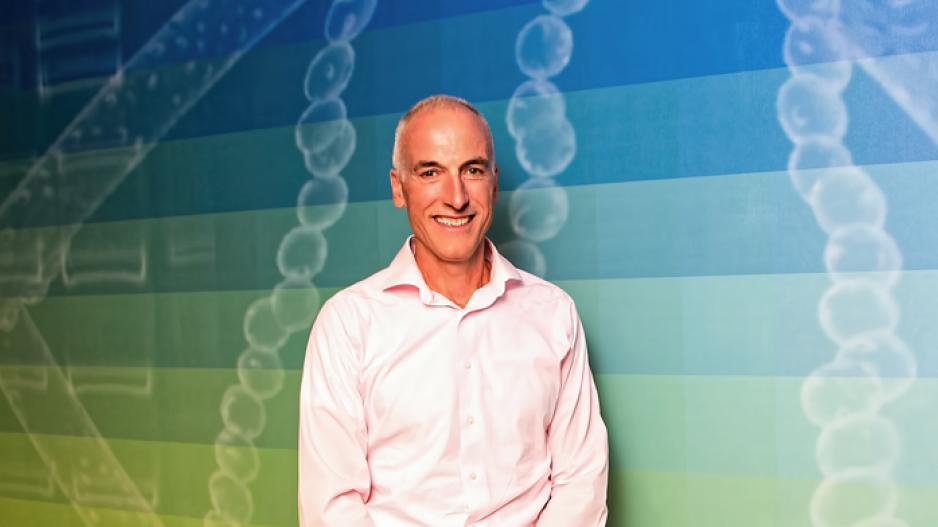Tony Brooks doesn’t mind a challenge.
As a steward of Genome BC’s research funding portfolio, Brooks oversees a massive amount of investment into genomics research projects. The investment decisions are challengingly complex, and so too is the science that they are helping to boost.
“We have projects that tackle really difficult things,” Brooks said. “We had a project a few years ago in health, and they identified that there were 77 variables involved. Trying to design a project that’s going to give a meaningful result when you’ve got 77 variables – that’s a challenge.... You can’t always expect to have a great result. Sometimes things fail. That’s the nature of research.”
Founded in 2001, Genome BC is a non-profit organization that channels funds from the federal and provincial governments, as well as from national and international public and private sources, into genomics innovation and research projects. It has become a major stimulus for B.C.’s burgeoning life sciences economy.
The organization has invested $850 million into research and commercial businesses in sectors including life sciences, health, forestry, fisheries, agri-food, mining and more.
Genome BC is involved in 130 projects, said Brooks, who joined the organization in 2005.
“It’s an ongoing challenge to keep the funders understanding that we are relevant and it’s worth funding the work that we do,” said Brooks, who isn’t afraid of a challenge whether on the job or on vacation. (When Business in Vancouver reached Brooks, he and his wife were amid a 4,000-kilometre self-guided four-by-four adventure across Namibia and Botswana.)
Brooks achieved a PhD in developmental biology before making the transition from science to the business world. At Genome BC, he was able to marry his two aptitudes.
“We fund research across the whole spectrum,” he said. “We don’t have the expertise in-house to determine what the best projects are. We use international peer review panels to review the research, and they will say this is the best project or these are the best three projects out of six.”
He said the program works by providing loan funding to early-stage companies to help them through the so-called “valley of death” – the gap that sucks down many upstart companies as they try to transition from seed funding to a substantive infusion of venture capital.
“Companies obviously need funds and they can’t get bank financing, obviously, because they’re a long way from making any revenues,” Brooks said.
“As a not-for-profit ... we’re not driven by shareholders saying, ‘You’ve got to make a bigger profit or a bigger margin,’ or something like that,” he said. “We’re really just trying to help these companies, and if we can get our money back, we will help another company.”
The program seems to be working so far. Genome BC says it has advanced 40 companies and facilitated 764 partnerships and 576 patent applications.
Part of the work is to vet the projects thoroughly.
“The applicants have to provide evidence that they’re going to be managed in a certain way,” Brooks said. “They have to identify who the key decision-makers are. They have to identify clear milestones, and we demand all of that up front, and then that package gets approved or not.”
He said the proposals that seem too complicated or ambitious often are.
“Often the proposals that have too many moving parts that don’t look good on paper, they end up struggling as a project,” he said. “We have a formula that works for us.”
Outside of his professional work, Brooks also serves with the international steering committee for the International Cooperation to Sequence the
Atlantic Salmon Genome (ICSASG) and was on the organizing committee for the 23rd international congress of the Transplantation Society.
Reflecting on his 13 years with Genome BC, Brooks points to the ICSASG, a consortium it joined in 2009 with Norway and Chile to sequence the Atlantic salmon genome – a project that created data now being used across the world by Atlantic salmon farmers.
“That was a milestone for me because I had come full circle from when I did my PhD on Atlantic salmon,” he said. “Personally, for me that was a very special moment.”
With help from Genome BC funding, breakthroughs have been made in rare-disease research, genetic testing for cancers and many more avenues, he said.
“These are very important projects. That’s what makes this role so exciting.” •
Business in Vancouver and the Chartered Professional Accountants of British Columbia will honour the province’s top CFOs at the BC CFO Awards gala dinner, being held June 7 at the Fairmont Waterfront Hotel. For more information or to register, go to biv.com/bc-cfo-awards.




